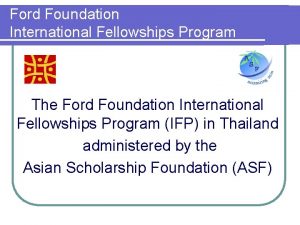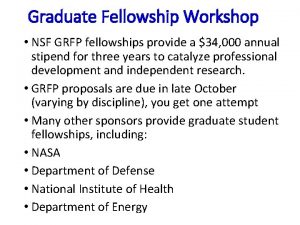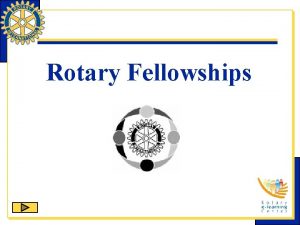NSF and Graduate Education 1 Graduate fellowships for




- Slides: 4

NSF and Graduate Education 1. Graduate fellowships for individuals (GRFP) a. b. c. 2008: 913 awards/133 underrepresented 1952 -2008 sucess rate of ~8 -9% 2009 and beyond - doubling of fellowship awards 2. IGERT training grants (~400 students supported per year) 3. Unknown number of individuals supported as part of research grants 4. Dissertation improvement grants

What should the Training Grant accomplish? 1. Create or plug into a “critical mass” cohort of students and mentors 2. Act as a quality control mechanism for trainee background and diversity 3. Challenge the existing paradigm which assumes that most trainees will continue in an academic environment that uses the journal-conference-grant model (use NSF innovation culture) 4. Use a minimally burdensome application procedure that will suffice for appropriate evaluation but not dissuade applicants 5. Attempt to build on existing institutional frameworks, to enhance and evolve, rather than disrupt existing programs 6. Require institutional financial and administrative commitment to ensure that institutions do not substitute NSF support for their own commitment

Other issues 1. Faculty are generally not rewarded for taking lead in TG programs 2. Universities withdraw support as graduate training does not rise high in priorities 3. Biology laboratories become predominantly populated with postdoctoral fellows 4. These are often foreign, and increasingly return to their home countries where science investment is booming

Training Grant Questions 1. What should be the award size and duration? 2. How many grad students per award. 3. Which graduate education years would be eligible for support? 4. What would be covered? 5. Should training grants be focused in specific areas where there is perceived need to “build expertise? ” 6. Other questions?







